Sleepless Nights With Neuropathy Pain
It’s late, the house is quiet, and instead of drifting off to sleep, your feet are burning, tingling, or aching. Many people with neuropathy find their pain spikes at night, just when they need rest the most.
There are clear reasons this happens — changes in blood flow, nerve activity, stress, and evening habits. Once you understand them, you can take simple steps to make nights easier.
Why Neuropathy Pain Feels Worse at Night
If you’ve ever tossed and turned while your feet burned, you know the frustration. You want sleep, but the pain gets louder in the quiet. Think of it like a puzzle with a few pieces — once you see them, the path to relief gets clearer.
1. Fewer Distractions
During the day, your mind is busy. At night, the quiet makes pain stand out because there’s nothing else to drown it out.
2. Circulation Slows When You Rest
When you lie down, blood flow changes. If circulation in your feet and legs is already weak, tingling or burning can flare.
3. Nerves Misfire During Repair
Night is when your body does a lot of repair work. Damaged nerves can “misfire” as they try to heal, sending sharp or odd signals that keep you awake.
4. Fatigue and Stress Amplify Pain
Pain often feels stronger when you’re worn down. By evening, stress and fatigue can turn up the volume on pain signals.
5. Evening Habits Can Trigger Pain
Late‑night sugar, alcohol, large meals, or certain meds can set the stage for a restless night.
Simple Ways to Sleep Better With Neuropathy Pain
You don’t have to just “put up with it.” These small steps can help you rest more easily.
Create a Bedtime Routine That Signals Rest
Your body likes routine. Do the same few things each night — dim lights, light stretching, a calming book — to teach your body it’s time to wind down.
Try Gentle Movement Before Bed
A little movement helps blood flow and can make your feet feel lighter:
- Take a short walk around the house.
- Do light ankle rolls or calf stretches.
Use a Circulation Device Like NeuroGo
Many people find relief by lightly stimulating their feet before sleep. The NeuroGo foot stimulator uses gentle electrical pulses to get your feet contracting and relaxing — like a mini workout without strain. A single 15‑minute session in the evening can boost circulation, relax tight muscles, and help ease nighttime pain.
Warm (Not Hot) Foot Soaks
Soak your feet in warm water to improve blood flow and ease tension. Keep it warm, not hot, to avoid flare‑ups.
Find a Comfortable Sleeping Position
- Side sleeping with a pillow between your knees.
- Slight leg elevation with a pillow under calves.
- Avoid heavy blankets pressing on your feet.
Watch Evening Habits
- Skip sugary snacks and alcohol close to bedtime.
- Keep dinner lighter and earlier.
- If needed, try a small, steady snack (nuts or a slice of low‑carb avocado toast).
Lower Stress Before Bed
- Slow, deep breathing for a few minutes.
- Calming music or a quiet routine.
- Jot down worries so your mind doesn’t race.
Small win: Even one or two of these steps — done nightly — can help you fall asleep faster and wake up feeling more in control.
Bringing It All Together
Nighttime nerve pain is common — and it’s not “in your head.” Understand the causes, make a few smart changes, and use tools like NeuroGo to support better blood flow before bed. You may not erase every flare‑up, but more restful nights are possible — one small habit at a time.

Stop Neuropathy Foot Pain
Discover 7 simple ways to relieve the burning, tingling, and numbness in your feet — starting today.
Get Your Free Copy →